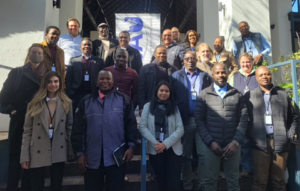Practical Perspectives: Amplifying farmers’ voices on equitable and sustainable agriculture
1 August 2022Achieving equitable and sustainable agricultural policy simply cannot be done without listening to farmers. On the frontlines of challenges like climate change, the insights of farmers and their in-depth understanding of what needs to change and how are essential.
That is why the Just Rural Transition (JRT) team is proud to have kickstarted a consultative process – Practical Perspectives – to engage farmers from around the world on how policy reform and public funding can better support a transition to fair and sustainable food systems in the face of the food security, climate, and nature crises.
Global dialogue
The General Assembly of the World Farmers’ Organization in June provided the perfect location for our first Practical Perspectives consultation. At this global event, participants discussed ideas around the international challenge of building sustainable food systems and explored the complex issues that need to be translated into robust agricultural policy around the world.
The Assembly was also an opportunity to explore local solutions to the critical challenges now threatening food production globally – and how these could be applied elsewhere. A plenary moderated by JRT’s Executive Director, Melissa Pinfield, highlighted several innovative examples.
We heard, for example, how farmers in Italy are reclaiming traditions to initiate more environmentally conscious production, how Jamaican women are leading the economic and social transformation of their rural communities through improved access to finance and resources, and how agroforestry and innovative farming methods are benefiting young people in Ghana.
Voices from Southern Africa
Our second Practical Perspectives event was a regional dialogue in Johannesburg, South Africa, focusing on member states of the Southern African Development Community and co-hosted with the Southern African Confederation of Agricultural Unions and the Netherlands Food Partnership. Participants came from across the sector, representing both large- and small-scale commercial agriculture, as well as subsistence and organic farming.

Through open and candid dialogue, participants examined the status of public support to agriculture and food systems in the region. They identified key weaknesses and they discussed solutions particularly around the need to stimulate sustainable value chains and poverty alleviation and to tackle climate adaptation and mitigation.
Participants from different countries and backgrounds shared case studies and examined approaches to ensuring national food and nutrition security and economic growth through agriculture. This in turn helped to identify priority action areas for different types of farmers.
For fully commercial farmers and those moving into that phase, key action areas included a) infrastructure development, such as better road or rail links, b) tenure security, such as long-term lease agreements, and c) enhancing value chains by empowering farmers groups to get good prices from buyers, for instance. Subsistence farmers, usually the poorest sector of the community, need different help, such as conditional cash transfers, livelihood programs, and skills development.
Refining policy
Among the key messages that farmers felt were crucial for policymakers was the need to ‘repurpose’ public support – redirecting public funds to better target aspects such as climate mitigation and adaptation and ensuring vibrant economic growth.
On input subsidies – which are aimed at reducing the cost of inputs such as fertilizer or feed – the participants urged policymakers to redirect some of these funds to factors urgently needed to make subsidies fully effective, such as market development. To ensure progress is made toward truly sustainable food systems, subsidies should also be conditional on a stepwise shift to practices that protect natural ecosystems and build climate resilience while minimizing productivity shortfalls.
Participants were also keen to highlight the importance of the inclusion of all key stakeholders when creating effective agricultural policy, especially taking into account the unique insights of farmers of all types, from those running large-scale agricultural interests to the smallest-scale subsistence farmers.
As a result of these successful discussions, real-world action is taking place. There are now plans to establish a multi-stakeholder taskforce to put forward recommendations for an agricultural policy framework that centres equity, sustainability and a just transition. Farmer organisations are also making plans to convene on national scales to align their positions and reach out to other stakeholders.
Next steps
Our next Practical Perspectives event will take place in September this year, in Rabat, Morocco, where we look forward to partnering with National Institute for Agricultural Research Morocco (INRA). Again, this dialogue will bring together farmers, farmer organisations, civil societies, and others for a productive and open discussion on the future of farming and food production in Northern Africa and The Sahel.
Crucially, these events give farmers a chance to provide insights and help improve the design of policies supporting a sorely needed transition to equitable and sustainable food systems. Insights and key findings from all the dialogues will be published and made available to governments and policymakers ahead of the UN climate talks at COP27, ensuring that the voices of farmers – at the heart of agriculture and on the frontlines of the climate crisis – are truly heard.
Interested in hearing more? Search for #JRTFarmerDialogues to join the online conversation on Twitter or sign up to our newsletter now!
To learn more about this work and find out how to get involved, please contact: pac@merid.org
